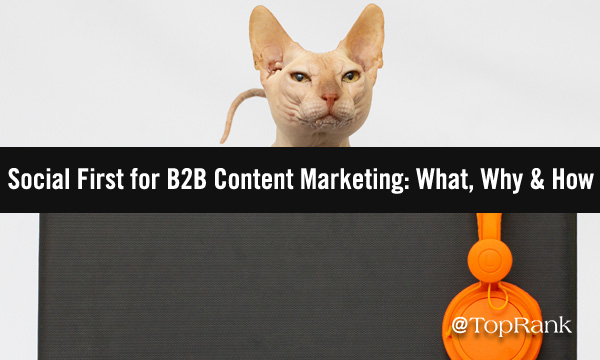
 When I think about social media marketing, especially for B2B, I’m reminded of words of wisdom from one of my favorite bands: The more you try to shave the cat The more the thing will bite and scratch It’s best, I think, to leave its fur And listen to its silky purr Some people like to make life a little tougher than it is. — Cake, Tougher than It Is (Seriously, give it a listen, it’s a bop). How does this apply to B2B social media marketing? Well, marketers, we’ve been trying to shave that particular cat for a decade.
When I think about social media marketing, especially for B2B, I’m reminded of words of wisdom from one of my favorite bands: The more you try to shave the cat The more the thing will bite and scratch It’s best, I think, to leave its fur And listen to its silky purr Some people like to make life a little tougher than it is. — Cake, Tougher than It Is (Seriously, give it a listen, it’s a bop). How does this apply to B2B social media marketing? Well, marketers, we’ve been trying to shave that particular cat for a decade.
The Problem with Most B2B Social Media Marketing
The goal of a social media site is to keep people on the platform — reading, commenting, interacting, infinitely scrolling. Meanwhile, marketers are trying to get people off the social media platform. We create blog posts, white papers, assets of every flavor, and post links to social media. We want social to be a gateway to our content. And as we work at cross purposes, social media algorithms bite and scratch: Organic reach shrinks, our posts get buried in the feed, and our engagement goes kaput.One Solution: “Social First” Content
Now, our agency hasn’t given up on blog posts, or on any other type of long-form content. There’s plenty of value in building a content library, staking out your position in the SERP, creating assets — it’s just that organic social isn’t always the best fit for promoting content. Instead, we’re creating content that does what the algorithm wants it to do: Engage people on the platform, start a conversation, and rack up comments, likes and shares. We call it Social First, not Social Only, because it’s still content that can be repurposed in blog posts and other assets. But the primary goal is to maximize engagement on the platform. We measure success by views, comments, reactions and shares. The result: Content that makes the algorithms purr. It’s more visible in people’s feeds, which leads to more engagement, which leads to more visibility. In a social first pilot program for LinkedIn Marketing Solutions, the social first posts tripled their usual engagement rate.How to Create Social First Content
Our platform of choice for social first is LinkedIn. Long-form content doesn’t really work on Twitter, as anyone who has tried to read a Twitter thread can tell you. Facebook supports longer posts, but we want to reach people in a business mindset. People come to LinkedIn for thought leadership and practical business advice. We’ve found that to be the perfect fit for our content. Here’s how to create a great social first post:1 — Hit the Sweet Spot for Word Count
Your posts should be shorter than the average blog post, but longer than the usual social media post. We’ve found that 150-200 words is just the right length to provide substance without exhausting people’s attention spans. Use more white space than you would for a blog post, too — short paragraphs with 1-2 sentences will keep people reading. And use a hashtag that’s unique to the series, so people can easily find them.2 — Start a Conversation
Go for a topic that’s thought-provoking and invites people to respond. For example:- A controversial take on an industry norm
- Sharing a story and inviting others to share their experience
- Recommendations for resources, like a book review
- Reminiscing about the history of the industry and looking at how far you’ve come
3 — Involve Influencers
I know, it’s a big shock to hear our agency recommend influencer marketing. We try to co-create with influencers for every piece of content we produce. That said, though, social first is an ideal fit for influencers:- It’s a smaller ask than a blog post or interview
- We’re not asking them to link off of social media
- They can engage with responses right on their social feed
- It’s easy for them to promote and re-share the content
4 — Reuse, Recycle, Repurpose
Once your social first content has had some time to shine, roll up the posts into a blog. Add the link as a comment in each social first post, and be sure to tag any influencers who were featured, or who engaged with the original post. You can also pull quotes from the posts to make into social media images, add to your next eBook, spice up your next few blog posts — there are plenty of ways to apply this content across your content strategy.It’s Time to Socialize
In the never-ending struggle to earn attention, B2B marketers have to use every strategy we have. And we have to make sure our goals for each channel line up with that channels’ strengths and weaknesses. For social media, that means giving the algorithm what it wants: substantial posts designed to provoke comments, likes, reactions and shares. The next time you’re revising your content plan, make sure social first is part of your mix. Need help creating B2B content that earns attention and inspires action? Let’s talk.The post Social First for B2B Content Marketing: What, Why and How appeared first on B2B Marketing Blog - TopRank®.
0 Commentaires